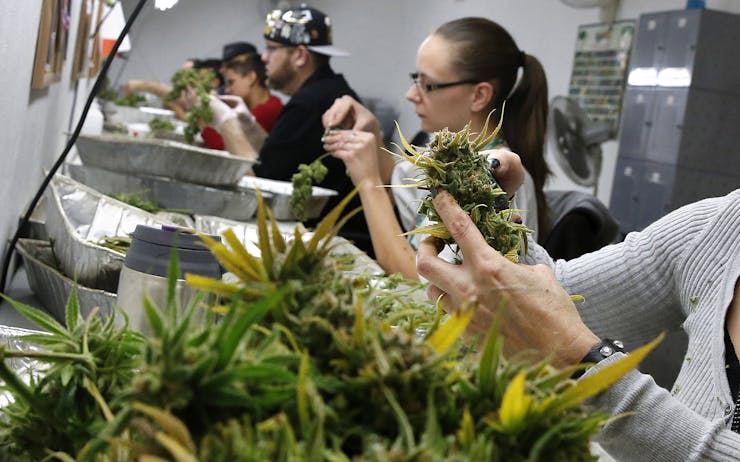As the roughly $7 billion legal cannabis industry spreads, there’s been some confusion around how the industry is regulated—and we’re not just talking banking and labeling. For more than 122,000 full-time workers, it hasn’t been clear who’s looking out for their rights and safety.
So Colorado wants to clear things up.
More than three years after the state became the first state to open retail cannabis stores, Colorado regulators have unveiled a comprehensive guide to cannabis-industry working conditions. The first-of-its kind document combines industry best practices with existing workplace rules.
One important takeaway: Yes, even cannabis producers are expected to comply with federal Occupational Health and Safety Administration (OSHA) regulations.
The “Guide to Worker Safety and Health in the Marijuana Industry” was created by a working group that included epidemiologists, doctors, industrial hygienists, safety professionals, industry leaders, and regulatory specialists.
Many buy into the myth that because cannabis is prohibited on the national level, federal workplace regulations don’t apply.
“We just felt that we wanted to help the industry and highlight some of the hazards that were unique to the cultivation industry,” said Roberta Smith, occupational health program manager for the Colorado Department of Public Health and the Environment, which developed the guide.
Jolene Donahue, a consultant who specializes in helping cannabis producers meet OSHA standards, headed the safety and security subcommittee of the working group that drafted the guide. She told Leafly she’s witnessed a lack of industry knowledge about workplace safety regulation. For example, she said many buy into the myth that because cannabis is prohibited on the national level, federal workplace regulations don’t apply. But the idea is just that—a myth.
When it comes to cannabis businesses, OSHA “doesn’t do random inspections at this point,” Donahue said, “but they do come in on complaints or referrals. If they’ve inspected one location for an employer they can inspect the other ones, and they do routinely inspect the other ones.”
Congress passed the Occupational Health and Safety Act in 1970 to set and enforce health and safety standards in the workplace. The law requires safety training in potentially dangerous positions, proper labeling of hazardous chemicals, and education and enforcement of worker rights policies, among other mandates. Fines for noncompliance start at approximately $12,000.
Colorado’s new guide does not introduce any new regulation. Instead it pairs OSHA regulations common across industries, such as those around injury reporting, with issues specific to cannabis: proper handling of chemicals used for cleaning or plant nutrition, safe management of large water tanks, and precautions concerning common machinery used in processing, among others.
Because Colorado adheres to federal workplace safety standards (about half of US states have their own agencies with regulations that meet or exceed OSHA standards), Colorado’s trailblazing Guide to Worker Safety and Health in the Marijuana Industry is poised to serve as a model for states preparing to manage cannabis industries that will see tremendous growth.
It also lists potential workplace hazards by industry profession. Budtenders, for example, primarily risk exposure to allergens and workplace violence. Extraction technicians, on the other hand, need to exercise caution in handling volatile chemicals such as butane and while operating potentially dangerous machinery.
Smith says she has been in close contact with California Department of Public Health and the Environment, for example, while working on the creation of the Colorado guide.
Anthony Wagner, executive director of the Southern California Responsible Growers Council, an industry group that advocates for regulation, told Leafly he thinks Colorado’s guide is a positive step for the sector.
“Anything that is protecting employee’s safety, we support it,” Wagner says. “We are a business entity just like anybody else, and we firmly believe in putting safety as a top priority, including ensuring safety of our employees, especially in the manufacturing and cultivation area.”






